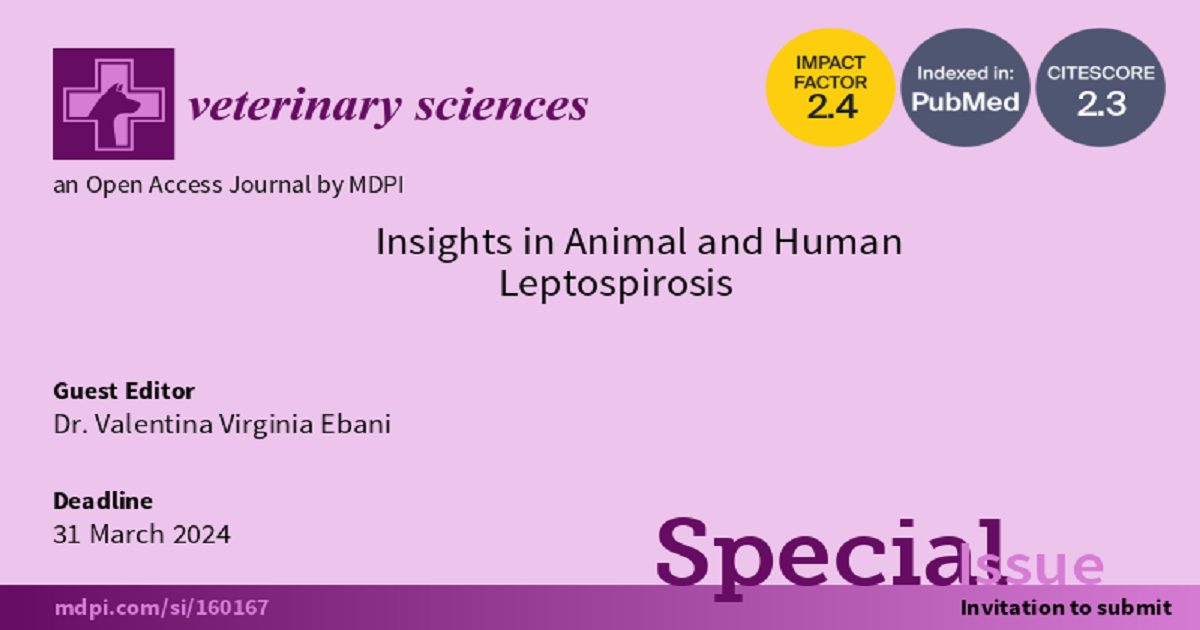- 2.3Impact Factor
- 3.5CiteScore
- 22 daysTime to First Decision
Insights in Animal and Human Leptospirosis
Special Issue Information
Dear Colleagues,
Leptospirosis is a zoonosis causing severe diseases both in humans and animals. Climatic changes observed in the last years favoured the spreading of pathogenic leptospirae; number of cases of leptospirosis often increase after hurricanes or floods when people may have to wade through contaminated water or use it for drinking or bathing. Leptospirosis causes economic losses in livestock due to reproductive disorders; lethal forms are still observed in dogs; wild animals act as the main accidental hosts. In view of these observation, we can affirm that leptospirosis is still a current treat not only in the developing countries where the prophylaxis measures are not regularly followed, but also in farm, domestic and urban environments.
The aim of this Special Issue is to give a platform for practitioners and researchers operating in human and veterinary medicine to exchange information and updates. With this goal, we cordially invite you to submit research articles, review articles, case reports and short communications related to the various aspects of Leptospira infections in humans and animals.
Dr. Valentina Virginia Ebani
Guest Editor
Manuscript Submission Information
Manuscripts should be submitted online at www.mdpi.com by registering and logging in to this website. Once you are registered, click here to go to the submission form. Manuscripts can be submitted until the deadline. All submissions that pass pre-check are peer-reviewed. Accepted papers will be published continuously in the journal (as soon as accepted) and will be listed together on the special issue website. Research articles, review articles as well as short communications are invited. For planned papers, a title and short abstract (about 250 words) can be sent to the Editorial Office for assessment.
Submitted manuscripts should not have been published previously, nor be under consideration for publication elsewhere (except conference proceedings papers). All manuscripts are thoroughly refereed through a single-blind peer-review process. A guide for authors and other relevant information for submission of manuscripts is available on the Instructions for Authors page. Veterinary Sciences is an international peer-reviewed open access monthly journal published by MDPI.
Please visit the Instructions for Authors page before submitting a manuscript. The Article Processing Charge (APC) for publication in this open access journal is 2100 CHF (Swiss Francs). Submitted papers should be well formatted and use good English. Authors may use MDPI's English editing service prior to publication or during author revisions.
Keywords
- leptospirosis
- epidemiology
- clinical forms
- pathological lesions
- diagnosis
- prophylaxis
- farm animals
- companion animals
- wildlife
- exotic animals
- human leptospirosis

Benefits of Publishing in a Special Issue
- Ease of navigation: Grouping papers by topic helps scholars navigate broad scope journals more efficiently.
- Greater discoverability: Special Issues support the reach and impact of scientific research. Articles in Special Issues are more discoverable and cited more frequently.
- Expansion of research network: Special Issues facilitate connections among authors, fostering scientific collaborations.
- External promotion: Articles in Special Issues are often promoted through the journal's social media, increasing their visibility.
- e-Book format: Special Issues with more than 10 articles can be published as dedicated e-books, ensuring wide and rapid dissemination.

